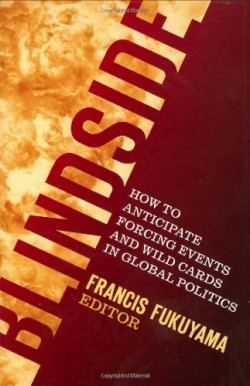
Blindside
How To Anticipate Forcing Events and Wild Cards in Global Politics
Contingency Plans: Like 9/11, Katrina, anthrax, and oil shortage; there’s nothing as certain as death and change. Francis Fukuyama, author of The End of History and Bernard L. Schwartz Professor of Political Economy at Johns Hopkins, is the editor of Blindside: How To Anticipate Forcing Events and Wild Cards in Global Politics (Brookings Institution Press, 250 pages, hardcover, $27.95, 978-0-8157-2990-7), a collection of essays. “Anticipating and dealing with what were thought to have been very low-probability events have clearly become central challenges in public and private sector alike all over the world,” he writes. Although he hedges that any technology or method can predict the unpreventable, Fukuyama offers creative thinking about the future from professors, think tank members, and professionals.
U.S. Appeals Court judge Richard A. Posner, in the first essay, tackles the problem of “Thinking About Catastrophe.” Named one of the top twenty legal thinkers in the U.S. by a 2004 Legal Affairs magazine poll, he considers both the analytical and psychological effects of the known and the anticipated. “In a democratic society,” he says, “the reactions of nonexperts, that is, of ordinary people, have a significant impact on public policy.”
Other essays concerning disease, the impact of Asia on world economy, and DARPA (Defense Advanced Research Projects Agency) fill this lively book.
Disclosure: This article is not an endorsement, but a review. The publisher of this book provided free copies of the book to have their book reviewed by a professional reviewer. No fee was paid by the publisher for this review. Foreword Reviews only recommends books that we love. Foreword Magazine, Inc. is disclosing this in accordance with the Federal Trade Commission’s 16 CFR, Part 255.
